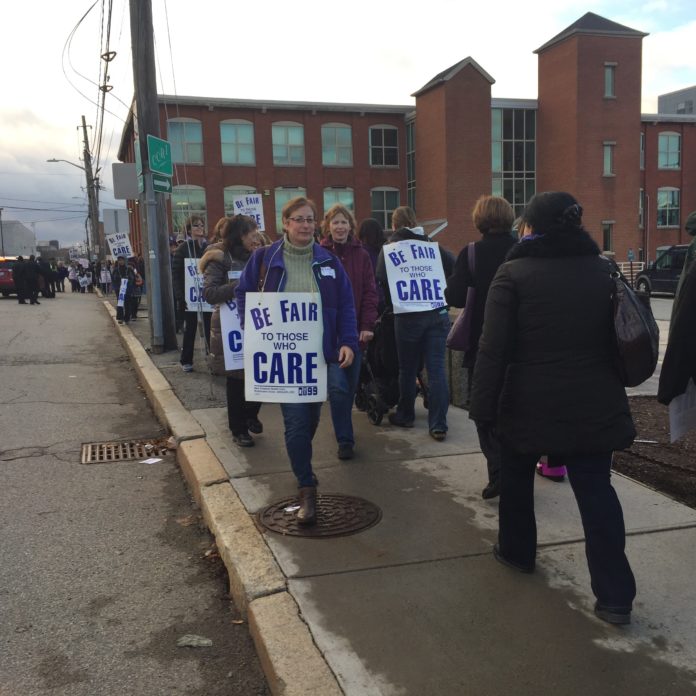
PROVIDENCE – Unionized employees of Women & Infants Hospital of Rhode Island, a Care New England facility, picketed on the afternoon of Wednesday, Dec. 7 outside of CNE’s corporate offices on Willard Avenue, only a few blocks from the hospital.
The need for safe staffing levels was a key component of the protest. Earlier that day, employees delivered a petition signed by more than 1,300 employees to CNE management addressing safe staffing levels, quality care and putting “patient need before corporate greed,” according to a press statement from District 1199 SEIU New England, the largest union in the Care New England system. It represents more than 1,700 Women & Infants employees and more than 500 Butler Hospital employees. SEIU 1199 NE’s four-year contract with Women & Infants expired Nov. 30.
Signs bearing the message: “Be Fair to Those Who Care” were carried high by picketers, including a few children. Chas Walker, an SEIU 1199 NE spokesperson, said that more than 600 individuals picketed during the afternoon.
Lisa Emery, a labor and delivery room nurse for 21 years, asserted that open positions – from retirements or otherwise – are left unfilled. “We were always told that they would re-post them, but they never did,” she said. “We did a whole reorganization of staffing to find out where the holes were and to have them filled … they didn’t do anything with that [information].”
Although queried picketers could not identify current staffing levels and what safe staffing levels would be in any specific department, Patrick J. Quinn, SEIU 1199 NE executive vice president, said that no one has replaced the eight to 10 labor and delivery room nursing staffers who retired in the past two-and-a-half years, with similar situations elsewhere in the hospital. “Only 145 of almost 1,800 employees have worked here fewer than five years,” he said.
It’s not only nurses affected by shortages; housekeeping staff, respiratory therapists, aides and others are also impacted, picketers said.
“Women & Infants unionized staff work in a superb environment and receive excellent compensation,” a hospital statement said. “In most every job category, the wages and benefits for Women & Infants employees are among the highest in hospitals across Rhode Island.”
Addressing the staffing shortage by paying employees double-time is not sustainable; it’s not good for the nurses or patient care, said Quinn. Further, he said, management is moving too slowly on negotiations and its approach to changing staff schedules every couple of months is unsustainable. That disrupts their lives outside of work, with child care and other commitments, said Quinn.
“Scheduling flexibility allows us to preserve jobs, provide exceptional care for patients, decrease costs and be efficient … required by this new national health care environment,” said Angelleen Peters-Lewis, CNE senior vice president and chief nursing officer, after the protest. “We are committed to providing the right staff to our patients at the right time.”
Government regulators, payers and the broader community pressure hospitals, including Women & Infants, to improve care quality, boost the patient experience and reduce costs, a hospital statement noted.
“If we have an agreement [with management], we will be asking people to vote on the agreement … on Sunday [Dec. 11] and Monday [Dec. 12]; if we don’t have an agreement, we will ask people to authorize a strike,” said Quinn.
“We don’t believe the union wants the strike, and we don’t want a strike; that doesn’t benefit anyone,” said Peters-Lewis.
“We believe our staff are our most precious resource; they provide exceptional care to patients and families. We want to work with them to reach a fair and equitable agreement.” The hospital has contingency plans to respond to a strike, Peters-Lewis said.
Health care dollars should go to delivering health care, not to administration or excessive CEO salaries, said Quinn. A union flyer reported salaries of nearly $10 million in 2014 to the top 19 CNE executives – including $1.3 million to CNE CEO Dennis D. Keefe. That flyer depicted Keefe with dollar signs over his eyes.
People fail to appreciate that all societal ills show up at the hospital, which delivers more than 8,000 babies each year, said Quinn. “The opioid crisis is also an OB/GYN crisis; addicted moms have babies … Our patients are more complex; older women are having babies and … gestational diabetes. Nothing is routine anymore.”
The picketers’ belief that the hospital is an extraordinary place was echoed by Peters-Lewis, who said, “We’re … a gem in … Rhode Island.”












